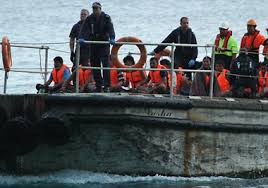Afghan authorities have launched a campaign aimed at raising people's awareness about the risks of taking illegal avenues to a new life abroad.
Afghanistan has earned a reputation as a source of illegal immigrants, refugees, and asylum seekers, prompting a backlash from some destination countries.
With nearly 2.6 million refugees in more than 80 countries, Afghanistan was the leading country of origin for refugees in 2012. And as the end-of-2014 withdrawal date for North Atlantic Treaty Organization troops nears, concerns have risen that the exodus of Afghans will only increase.
"Many Afghans who consider seeking asylum abroad have little knowledge of the dangers involved," says Siddiq Hazratzai, a spokesperson for the Kabul office of the International Organization for Migration (IOM).
The IOM is teaming up with Afghanistan's Refugee and Repatriation Ministry, Labor and Social Affairs Ministry, and the United Nations Children's Fund to carry out the three-month awareness campaign in all of Afghanistan's 34 provinces.
"The campaign aims at providing people with a wide range of relevant information, such as tightened immigration policies of host countries, the risks of falling victim to human traffickers, or treacherous routes to reach destination countries," Hazratzai says.
State media is expected to play a major role in the campaign. Posters warning people of potential risks will be displayed in Kabul and other large cities.
In villages, authorities have asked influential imams and tribal elders to raise the issue with local residents during mosque sermons and private gatherings.
Accurate stats hard to come by
Armed conflict, widespread poverty, and a lack of opportunity have forced millions of Afghans to leave in search of better lives abroad.
According to a recent report by the United Nations, one in four refugees in the world is from Afghanistan.
The UN statistics indicate that the number of Afghans who applied for political asylum worldwide has increased by some 30% in the past two years.
Hazratzai says thousands of young men from rural villages migrate to neighboring Iran and Pakistan to find jobs.
"City dwellers and educated professionals mostly consider farther destinations, such as Europe and Australia," he says.
"Clear statistics about the number of illegal migrants from Afghanistan do not exist, because they usually travel to destination countries with the help of people smugglers," Hazratzai continues. "They cross borders where border police or legal checkpoints don't exist."
Potential asylum seekers have been known to pay up to $20,000 to smugglers who organize dangerous journeys to major refugee destinations - Europe, North America, and Australia.
Danger at sea
Afghan officials say the emigrants face the risk of assault or abandonment along the way by traffickers or deportation by authorities in destination countries.
Some risk their lives trying to make their way to Australia or Europe on overloaded, unseaworthy boats.
According to IOM figures, 26 Afghan asylum seekers drowned at sea while attempting to reach Greece by boat from Turkey in December 2012.
Authorities in Australia say Afghanistan - along with Iran, Iraq, and Sri Lanka - is an origin country of many asylum seekers who arrive in Australia on boats from Indonesian ports.
Hundreds have drowned en route in recent years when poorly maintained, rickety vessels capsized during the hazardous journey.
The situation has prompted Australian authorities to introduce a new policy to send asylum seekers to Papua New Guinea. The agreement signed in July by Australia and Papua New Guinea targets illegal immigrants arriving by boat to Australian territories.
According Australian media reports, the deal to redirect the asylum seekers to Papua New Guinea has slowed the flow of smuggling vessels. However, several such boats have been intercepted since the measure was announced.
On August 20, a boat carrying more than 100 would-be asylum seekers sank 220 kilometers north of Australia's Christmas Island. Some 105 people were rescued from the sinking vessel.
Ahmad Mateullah, a 19-year-old Kabul resident, predicts that the new awareness campaign will do little to discourage Afghans set on leaving.
"The situation in the country forces people to flee despite the risks," he says. "A day doesn't pass in Kabul without an explosion or a suicide attack. People also leave for economic reasons."
Mateullah says he intends to settle in Western Europe, where he has relatives. His first attempt to cross into Iran failed earlier this year.
"I don't see any future for myself in Afghanistan," Mateullah says. "You can't get any job here without connections or paying bribes."
Mateullah says his neighbor paid $14,000 to smugglers to take him to Belgium. Mateullah is considering his options to leave Afghanistan "at any cost". (Asia Times)
Afghanistan has earned a reputation as a source of illegal immigrants, refugees, and asylum seekers, prompting a backlash from some destination countries.
With nearly 2.6 million refugees in more than 80 countries, Afghanistan was the leading country of origin for refugees in 2012. And as the end-of-2014 withdrawal date for North Atlantic Treaty Organization troops nears, concerns have risen that the exodus of Afghans will only increase.
"Many Afghans who consider seeking asylum abroad have little knowledge of the dangers involved," says Siddiq Hazratzai, a spokesperson for the Kabul office of the International Organization for Migration (IOM).
The IOM is teaming up with Afghanistan's Refugee and Repatriation Ministry, Labor and Social Affairs Ministry, and the United Nations Children's Fund to carry out the three-month awareness campaign in all of Afghanistan's 34 provinces.
"The campaign aims at providing people with a wide range of relevant information, such as tightened immigration policies of host countries, the risks of falling victim to human traffickers, or treacherous routes to reach destination countries," Hazratzai says.
State media is expected to play a major role in the campaign. Posters warning people of potential risks will be displayed in Kabul and other large cities.
In villages, authorities have asked influential imams and tribal elders to raise the issue with local residents during mosque sermons and private gatherings.
Accurate stats hard to come by
Armed conflict, widespread poverty, and a lack of opportunity have forced millions of Afghans to leave in search of better lives abroad.
According to a recent report by the United Nations, one in four refugees in the world is from Afghanistan.
The UN statistics indicate that the number of Afghans who applied for political asylum worldwide has increased by some 30% in the past two years.
Hazratzai says thousands of young men from rural villages migrate to neighboring Iran and Pakistan to find jobs.
"City dwellers and educated professionals mostly consider farther destinations, such as Europe and Australia," he says.
"Clear statistics about the number of illegal migrants from Afghanistan do not exist, because they usually travel to destination countries with the help of people smugglers," Hazratzai continues. "They cross borders where border police or legal checkpoints don't exist."
Potential asylum seekers have been known to pay up to $20,000 to smugglers who organize dangerous journeys to major refugee destinations - Europe, North America, and Australia.
Danger at sea
Afghan officials say the emigrants face the risk of assault or abandonment along the way by traffickers or deportation by authorities in destination countries.
Some risk their lives trying to make their way to Australia or Europe on overloaded, unseaworthy boats.
According to IOM figures, 26 Afghan asylum seekers drowned at sea while attempting to reach Greece by boat from Turkey in December 2012.
Authorities in Australia say Afghanistan - along with Iran, Iraq, and Sri Lanka - is an origin country of many asylum seekers who arrive in Australia on boats from Indonesian ports.
Hundreds have drowned en route in recent years when poorly maintained, rickety vessels capsized during the hazardous journey.
The situation has prompted Australian authorities to introduce a new policy to send asylum seekers to Papua New Guinea. The agreement signed in July by Australia and Papua New Guinea targets illegal immigrants arriving by boat to Australian territories.
According Australian media reports, the deal to redirect the asylum seekers to Papua New Guinea has slowed the flow of smuggling vessels. However, several such boats have been intercepted since the measure was announced.
On August 20, a boat carrying more than 100 would-be asylum seekers sank 220 kilometers north of Australia's Christmas Island. Some 105 people were rescued from the sinking vessel.
Ahmad Mateullah, a 19-year-old Kabul resident, predicts that the new awareness campaign will do little to discourage Afghans set on leaving.
"The situation in the country forces people to flee despite the risks," he says. "A day doesn't pass in Kabul without an explosion or a suicide attack. People also leave for economic reasons."
Mateullah says he intends to settle in Western Europe, where he has relatives. His first attempt to cross into Iran failed earlier this year.
"I don't see any future for myself in Afghanistan," Mateullah says. "You can't get any job here without connections or paying bribes."
Mateullah says his neighbor paid $14,000 to smugglers to take him to Belgium. Mateullah is considering his options to leave Afghanistan "at any cost". (Asia Times)
Source : Afghan Voice Agency (AVA), International Service







